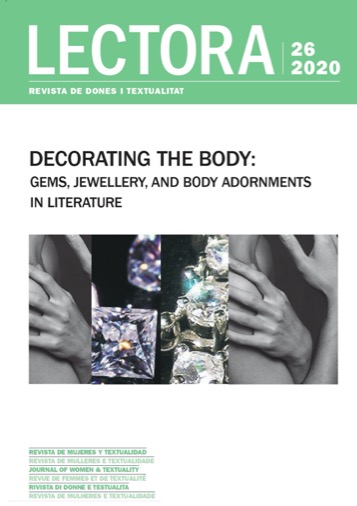Monique Wittig: Fifty Years after "Les guérillères" (Tribute and Notes on the Spanish Translation)
DOI:
https://doi.org/10.1344/Lectora2020.26.11Keywords:
Monique Wittig, Les guérillères, Spanish translation, censorshipAbstract
This article is written as a tribute to Les guérillères (1969) by Monique Wittig on its fiftieth anniversary, and it focuses specially on the sequences that were suppressed in the only translation that the text has had in Spain so far (Barcelona, Seix Barral, 1971). It provides the translation of those sequences and it considers the role that censorship could have in their elimination, as well as the effects of this deletion on the meaning of the text.
References
Alonso Campos, Juan Ignacio (2017), Carlos Barral. La edición en la España franquista, Tesis doctoral, Alcalá de Henares, Universidad de Alcalá de Henares, 15/03/2017. <http://hdl.handle.net/10017/37287>
Blanco Corujo, Oliva (2004), "Monique Wittig: réquiem por una guerrillera", Clepsydra, 3: 127-132.
Bourque, Dominique (2006), Écrire l'inter-dit. La subversión formelle dans l'oeuvre de Monique Wittig, París, L’Harmattan.
Cruz Hernández, Miguel (1987), "Del deterioro al desmantelamiento. Los últimos años de la censura de libros", Diálogos hispánicos de Amsterdam, 5: 41-56.
Del Olmo Campillo, Gemma (2018), "Cruce de fronteras. Relevancia de la sexualidad en el feminismo", Feminismo/s, 31: 65-81.
—(2019), "El desafío violeta. Un camino de libertad", Investigaciones feministas, 10 (1): 45-59.
Fariña Busto, María Jesús (2013), "Haciendo cosas con el lenguaje. La escritora en su taller", Las lesbianas (no) somos mujeres. En torno a Monique Wittig, Beatriz Suárez Briones (ed.), Barcelona, Icaria: 117-147.
—(2015), "Entre guerrilleras y andariegas: de Monique Wittig a Albalucía Ángel", Ambigua. Revista de investigaciones sobre género y estudios culturales, 2: 58-73.
"Joan Vinyoli", Associació d'Escriptors en Llengua Catalana, 10/12/2019.<https://www.escriptors.cat/autors/vinyolij>
"Josep Elias", Associació d'Escriptors en Llengua Catalana, 10/12/2019. <https://www.escriptors.cat/autors/eliasj>
Landry, Iraïs y Louis-Thomas Leguerrier (2018), "'Ce qui est à écrire violence': montage et dialectique dans Les guérillères de Monique Wittig", Études françaises, 54 (1): 117-134.
Larraz, Fernando (2018), "Gender, Translation and Censorship in Seix Barral's 'Biblioteca Breve' and 'Biblioteca Formentor' (1955-1975)", Foreign Women Authors under Fascism and Francoism: Gender, Translation and Censorship, Pilar Godayol y Annarita Taronna (eds.), Newcastle, Cambridge Scholars Publishing: 126-145.
Montejo, Lucía (2010), Discurso de autora: género y censura en la narrativa española de posguerra, Madrid, UNED.
Shaktini, Namascar (2005), "Introduction to 'For a Women's Liberation Movement'", On Monique Wittig. Theoretical, Political, and Literary Essays, Namascar Shaktini (ed.), Urbana & Chicago, University of Illinois Press: 15-20.
Suárez Briones, Beatriz (2013), "Cuando las lesbianas éramos mujeres", Las lesbianas (no) somos mujeres. En torno a Monique Wittig, Beatriz Suárez Briones (ed.), Barcelona, Icaria: 15-50.
Thibaut, Josy (2008), "Entretien. Monique Wittig raconte...", ProChoix, 46: 63-76.
Thomson, Clive (2006), "Dire l'alterité: Les guérillères de Monique Wittig", Acta poética, 27 (1): 273-291.
Wittig, Monique (1969a), El opoponax, Caridad Martínez (trad.), Barcelona, Seix Barral.
—(1969b), Les guérillères, París, Editions de Minuit.
—(1971), Las guerrilleras, Josep Elías y Juan Viñoly (trads.), Barcelona, Seix Barral.
—(1994), "Quelques remarques sur Les guérillères", L'esprit créateur, 34 (4): 116-122.
—(2006), El pensamiento heterosexual y otros ensayos, Javier Sáez y Paco Vidarte (trads.), Madrid & Barcelona, Egales.
—(2010), Le chantier littéraire, Donnemarie-Dontilly, Éditions iXe & Lyon, Presses Universitaires de Lyon.
Zerilli, Linda (2008), El feminismo y el abismo de la libertad, Buenos Aires, Fondo de Cultura Económica.
Downloads
Published
How to Cite
Issue
Section
License
The Author retains ownership of the copyright in this article and grants Lectora: revista de dones i textualitat the rights to print publication of the Article. The work will be available under a Creative Commons Attribution-Noncommercial-No Derivative Works license, by which the article must be credited to the Author and the Journal be credited as first place of publication.
The Author is free to enter in seperate, additional contractual agreements for the non-exclusive distribution of the work as published in this journal (such as institutional repositories or a book), as long as the original publication in Lectora is credited.
The Author is encouraged to post the work online (eg in institutional or thematic repositories, or in their website), as it can lead to productive exchanges as well as to a greater citation of the published work (see The Effect of Open Access).




